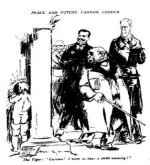- Location
- Visiting BWBs.
Comment on this latest article on Naming Wars by @Thande here.
IIRC somebody called it World War I before WW2 started; his reasoning was that he thought this would be the first in a series of world wars, and not the "war to end all wars" it was chalked up to be.Comment on this latest article on Naming Wars by @Thande here.
IIRC somebody called it World War I before WW2 started; his reasoning was that he thought this would be the first in a series of world wars, and not the "war to end all wars" it was chalked up to be.
IIRC somebody called it World War I before WW2 started; his reasoning was that he thought this would be the first in a series of world wars, and not the "war to end all wars" it was chalked up to be.
Yes. I always wondered if there was actually an intended subtle second layer to the joke about that. It wouldn't be out of place given how Mainwaring is a deeper character than a casual glance suggests.Suddenly, Mainwaring's claim he fought in the Great War "in 1919" seems less ignorant.
I think I first learned this from a QI episodeIIRC somebody called it World War I before WW2 started; his reasoning was that he thought this would be the first in a series of world wars, and not the "war to end all wars" it was chalked up to be.
I have seen more than one war memorial which dates the war 1914-19 due to deaths from wounds in 1919. In addition, which might be an interesting twist, Mainwaring may have been sent as part of the British Intervention in the Russian Civil War or as one of the occupying troops in the Rhineland. However, given in the final episode of the series it is revealed that Sergeant Wilson was actually a captain in the First World War, and fitting very much with his public school boy image, but Mainwaring dismisses that as not being relevant in this war, I think the reference to 1919 is a subtle joke, which would have been recognised quickly by viewers when the series was first aired. Despite being made captain in the Home Guard, Mainwaring has some of the least experience of combat of the older men in the platoon.Yes. I always wondered if there was actually an intended subtle second layer to the joke about that. It wouldn't be out of place given how Mainwaring is a deeper character than a casual glance suggests.
There was the eerily premonition cartoon well known at the time of the Peace Talks which sees the Class of 1940 mourning becoming cannon fodder.The "Second World War" was the subject of a speculative fiction/future history book (The City of Endless Night by Milo Hastings) published in 1920.

He follows up the 1919 comment at the time with “somebody had to clean up the mess!”, which I took as a reference to the dangers of demobilising the - at the time - most dangerous and explosive/trap-riddled battlefields in history. See also the 1919 on war memorials, dangerous work was being done.I have seen more than one war memorial which dates the war 1914-19 due to deaths from wounds in 1919. In addition, which might be an interesting twist, Mainwaring may have been sent as part of the British Intervention in the Russian Civil War or as one of the occupying troops in the Rhineland. However, given in the final episode of the series it is revealed that Sergeant Wilson was actually a captain in the First World War, and fitting very much with his public school boy image, but Mainwaring dismisses that as not being relevant in this war, I think the reference to 1919 is a subtle joke, which would have been recognised quickly by viewers when the series was first aired. Despite being made captain in the Home Guard, Mainwaring has some of the least experience of combat of the older men in the platoon.
I think I first learned this from a QI episode
Indeed. I'm pretty sure it's explicitly stated somewhere that he was in France/Belgium, rather than somewhere still seeing fighting, like Russia or the OE. I would have said the western front, but that might be anachronistic, given the armistice.He follows up the 1919 comment at the time with “somebody had to clean up the mess!”, which I took as a reference to the dangers of demobilising the - at the time - most dangerous and explosive/trap-riddled battlefields in history. See also the 1919 on war memorials, dangerous work was being done.
